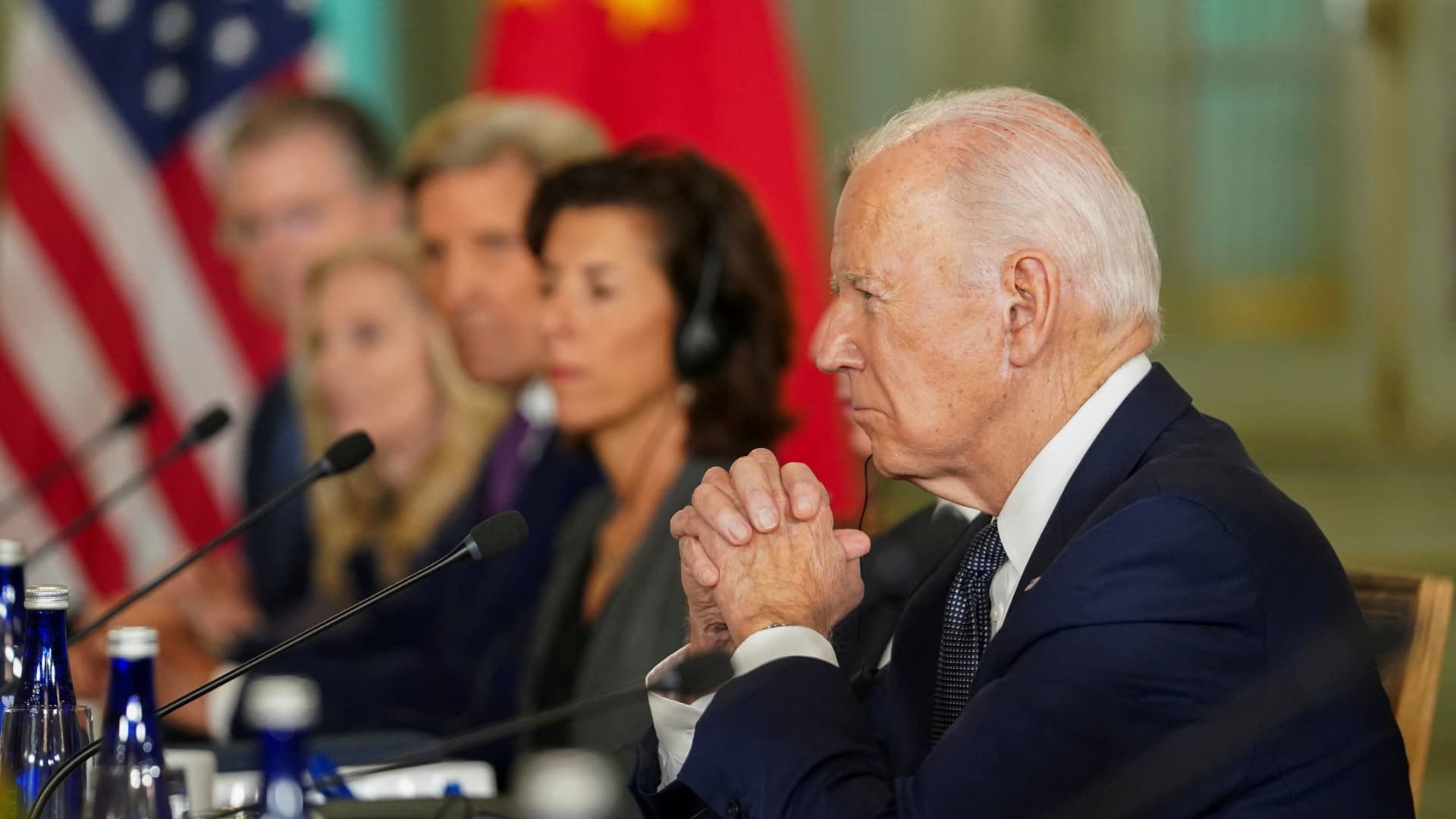On the 15th night of Ramadan, Majid Khan and his family of four sat down to a traditional Iftar meal in a suburb of Belize City to break up the daylight hours. There was a leg of lamb that Majid, a former Guantanamo prisoner, had slaughtered himself, sweets that a sister in Maryland had brought with her, dates from Saudi Arabia.
The mood was a little boisterous, but not enough to disturb the sleep of baby Hamza, who was born two weeks earlier in a hospital in the Central American city. The conversation was brief, about whether the biryani dish was too spicy and how the lamb was roasted to perfection.
These are mundane matters made all the more meaningful because Majid Khan, a former al-Qaeda courier, celebrated with his wife Rabia and daughter Manaal in their first home together, in Belize, their adopted homeland.
This family meal was not possible for two decades. After the Sept. 11, 2001, attacks, Mr. Khan joined al-Qaeda, agreed to become a suicide bomber and handed over $50,000 to be used in a deadly bombing of a hotel in Indonesia. For his crimes, he was held captive by the United States, tortured by the CIA, and then imprisoned in Guantánamo Bay. He pleaded guilty and became a government employee – all the while his wife was waiting for him in Pakistan.
“I waited for him for 20 years,” Rabia Khan said with a contented sigh. “Everyone said, ‘You’re brave. You are strong.’” Circumstances demanded it. “Now I say to Majid: ‘It’s all up to you, not me.'”
Big life questions await this family. Will 44-year-old Majid abandon his nascent terracotta pot import business? Does 40-year-old Rabia have to take her baby Hamza to Mexico to see a specialist for kidney disease? Where will Manaal, 20, go to college and then become a dentist?
But other struggles play a bigger role.
Majid still needs to find medical care for the damage he suffered in the CIA’s secret foreign prisons. He still has to fit in with the country that welcomed his family. Because of his past, he was unable to open a bank account.
“Life is a test,” he said, describing himself as a man half full. He sees the next chapter of his life as a chance to make things right. He was hurt, he said, and did things that hurt others. He punctuates his remarks with, “May God forgive.”
Even among the 750 men and boys who passed through Guantánamo prison, Majid Khan always stood out.
A Pakistani, he attended high school in a Baltimore suburb and became radicalized there after his mother’s death in 2001. That same year, after the September 11 attacks, he traveled to Pakistan at the age of 21 and married Rabia in an arranged form wedding. He also joined members of al-Qaeda, including men accused of plotting the September 11 attacks, and was recruited as a suicide bomber in a never-realized attempt on Pakistani President Pervez Musharraf. His decisions were impetuous and wrong, he says.
He was the first prisoner to be tortured in CIA custody into pleading guilty to war crimes, nearly a decade after being incarcerated as a “high-ranking detainee.” He spent more years in isolation from other prisoners than any other prisoner, much of that time as a government employee.
Rabia Khan spent those years as a single mother with her parents and a house full of sisters and brothers, nephews and nieces, raising Manaal, her child born after Majid’s capture.
In Guantanamo he prayed alone, slept alone and ate alone. “You get used to it,” he said. His Ramadan rations included three dates and sometimes a packet of honey.
They were reunited two months after his release. He met his daughter for the first time in the VIP lounge at the Belize airport. The man and woman, who lived apart in their 20s and 30s, didn’t feel like strangers.
“I don’t know why,” Rabia said. “Perhaps because of the letters?”
Manaal admits it was an exciting year, which began with the sudden news that the father she had never met had been released from prison. Eight weeks later, she and her mother traveled for 48 hours – from Karachi to Doha, to New York, to Miami and to Belize City – and joined him.
There have been visits from her father’s family in the United States, tours of tourist attractions on Belize’s Caribbean coast, and now a little brother – all making for a highly unusual sabbatical of a year or two before heading off to college.
She glides through her family’s three-bedroom house with an airy, idiosyncratic expression. She has her first bedroom to herself, now decorated with festive fairy lights. She designed Hamza’s birth announcement with the image of a heart-shaped balloon. Just minutes after his arrival, she sent it by phone from the hospital to the family in three time zones.
Outside the home, she and her mother wear robes, cover their hair with a hijab and their faces with Covid masks, a modern version of the strict niqab. He drives the family car, a used Chevy Equinox.
“I’m a Pakistani guy at heart with a slight American twist,” he said. “So I’m a bit of a feminist. But I firmly believe in Muslim modesty. And honor. I have to make sure my daughter is modest until she gets married.”
With around 415,000 inhabitants, the state of Belize is the size of New Jersey, where around 5 percent of the population lives. The official language is English, which is helpful. But for Majid Khan, a man in a hurry, integration was a challenge.
“He has not yet come to terms with Belizean laissez-faire,” said the leader of his mosque, Kaleem El-Amin, who calls himself Brother Kaleem. “I think he needs some more time.”
Majid has not yet opened a physical store or found a major commercial buyer for his business, where he sells painted pots from Pakistan.
Part of the problem is that no bank was willing to open an international account for the man who transferred $50,000 to an al-Qaeda affiliate without knowing its purpose. He was already in U.S. custody when the money was used in a bombing that killed about a dozen people at a Marriott Hotel in Jakarta, Indonesia, on August 5, 2003.
Belize blames post-9/11 regulations on global finance. A government official, who discussed the issue on condition of anonymity because it involves sensitive diplomatic relations, said the matter was beyond the reach of the Belize government and called it an “obstacle” to Majid building a sustainable business.
The family’s additional costs are debited from his father’s credit card when he comes to visit him for long periods of time. Any business he runs requires cash and sometimes a Belizean partner.
If his wife needs to take their baby abroad for medical care, he cannot accompany her. He has residency in Belize and a path to citizenship, but he has no travel documents at the request of the U.S. government.
He also requires medical care for an intestinal disorder and back pain, which he attributes to his years in the CIA’s intelligence services, where he was brutally interrogated and held in solitary confinement and was so distressed that he refused to eat. According to a declassified document, his American captors broke his hunger strike by instilling a “puree” of hummus, pasta with sauce, nuts and raisins into his rectum.
He said his wife had told him that he sometimes thrashes around in his sleep, but he couldn’t remember any nightmares. He had two free visits with a psychiatrist but chose not to continue treatment, costing $100 per visit. The doctor had no experience with the trauma of torture and “didn’t know what prison life was like,” he said.
“I need fixing,” he said. “Mentally, physically.”
Every Friday he drives 30 minutes to the mosque to pray in a Muslim community, something he was denied during his time in US custody. Some are Belizeans who converted to Islam or their descendants. Others are immigrants, many from Bangladesh.
The community welcomed him from day one, no questions asked, said Brother Kaleem, the imam who turned to Islam in the 1970s and was trained in Saudi Arabia. That’s the Belizean way – calm, accepting.
“If he stays here long enough, maybe his children will understand this place,” he said.
Rabia Khan says her husband is a “softer” version of the man she married. In her words, he is part American, part Pakistani, part Arab – an apt description.
To break his fast, he prefers Californian dates to Saudi dates. He has a basketball hoop in case his nephew comes to visit from the USA. He calls American visitors, including one old enough to be his mother, “dude.”
For the holiday he found a Belizean with livestock, brought a ritual knife and slaughtered a sheep. The couple then stored the portions in the newly purchased freezer. The slaughter was daunting. A halal butcher made it at home.
One evening before dinner at a Lebanese-style restaurant, he called the owner and asked if he could bring his own lamb. It was a religious thing, Majid explained, calling it “kosher.” The restaurateur agreed.
When Majid speaks about his life, his philosophy is not dissimilar to the one he told a military jury in 2021. His actions for al-Qaeda hurt people and were wrong, he said. May God forgive him. Likewise the torture he described to the panel. It was his first public account of what was done to him, and he said he had forgiven his captors.
“The reason I forgive is because I’ve done a lot of bad things,” he said, sitting on his couch with the baby sleeping in the crook of his arm. “The point is, I don’t hold any grudges. I could have been paralyzed for 20 years in a car accident. God has decided, ‘I will put you through this test.’”
His time in prison was a struggle, but a formative one. He learned that he could be mean and rude and write poetry. He also spent years separated from other inmates, accompanied by guards and federal agents who sometimes passed the time playing poker and smoking cigars.
One evening, as Rabia sits by the Old Belize River, she tells a story:
Majid had been missing for years. His family did not know whether he was dead or alive until the White House announced in September 2006 that he was among a group of CIA detainees being sent to Guantánamo.
From then on, in a moment of deep despair, he wrote her a letter: You have my permission to start over, to find a new husband.
At first she cried, she said. She hid the news from her family. Then she sent him an angry reply.
“She told me if I do this, I will never see Manaal,” he recalled with a shudder. “Never.”
Manaal was born in the seventh month of his imprisonment. He had no hope of being released and had yet to accept responsibility for his crimes, cooperate with the U.S. government and plead guilty.
This happened later, in 2012, more than a decade before he was released in Belize.
Source link
2024-05-10 05:33:56
www.nytimes.com















